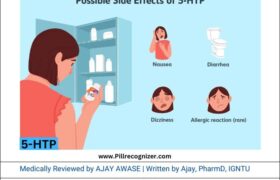Medically Reviewed by AJAY AWASE | Written by Ajay, PharmD, IGNTU
5-Htp – Uses, Side Effects, and More
Overview: 5-Htp
The body can transform 5-hydroxytryptophan (5-HTP) into serotonin. Depression is a common usage for it. There is little proof of it for anxiety and sleeplessness.
L-tryptophan, a building block of proteins, produces the chemical waste 5-HTP. Griffonia simplicifolia is an African plant whose seeds are used in its commercial production. 5-HTP functions in the brain and central nervous system by boosting serotonin synthesis. Sleep, appetite, temperature, sexual behavior, and pain perception are all influenced by serotonin.
5-HTP is utilized for conditions where serotonin is thought to play a significant role since it raises serotonin levels. These include anxiety, depression, and a host of other diseases, although the majority of these applications lack strong scientific backing.

Uses & Effectiveness:
Potentially Beneficial for Depression.
For some people, taking 5-HTP orally appears to alleviate their depressive symptoms. It may be just as effective as some antidepressants prescribed by a doctor.
Possibly Ineffective for:
Syndrome Downward. The majority of studies indicate that giving children with Down syndrome oral 5-HTP does not enhance their development or strength of muscles.
Many other uses of 5-HTP are being investigated, but not enough solid research has been done to determine whether or not these uses are beneficial.
Side Effects:
When taken by mouth: Taking 400 mg or more of 5-HTP per day for up to a year may be safe. Heartburn, stomach pain, nausea, vomiting, diarrhea, sleepiness, sexual dysfunction, and muscle difficulties are among the most frequent side effects. Large amounts of 5-HTP, like six to ten grams a day, may not be safe. Severe gastrointestinal issues and spasms in the muscles have been related to these dosages.
A dangerous medical disorder known as eosinophilia-myalgia syndrome (EMS) has been reported in certain 5-HTP users. A possible unintentional impurity in certain 5-HTP products is thought to be the cause of EMS by some patients. However, the scientific evidence is insufficient to determine if 5-HTP, a contaminant, or some other element is the cause of EMS. Use 5-HTP with caution until further information is available.
Special Precautions and Warnings:
When taken by mouth: Taking 400 mg of 5-HTP a day for up to a year may be considered safe. Heartburn, stomach pain, nausea, vomiting, diarrhea, sleepiness, sexual dysfunction, and muscle difficulties are among the most frequent side effects. Large amounts of 5-HTP, like six to ten grams a day, may not be safe. Severe gastrointestinal issues and spasms in the muscles have been related to these dosages.
Eosinophilia-myalgia syndrome (EMS) is a dangerous medical complication that some 5-HTP users have experienced. Some believe that an unintentional contamination in certain 5-HTP products could be the cause of EMS. However, there is little scientific data to determine if EMS results from a contaminant, 5-HTP, or another source. 5-HTP should be used with caution until further information is available. Breastfeeding during pregnancy: It’s not clear from enough trustworthy data whether 5-HTP is safe to use while expecting or nursing. Remain cautious and refrain from using.
Children: When given at the recommended dosages, oral 5-HTP may be safe for youngsters to consume. 5-HTP appears to be safe for use in children under the age of 12 for up to three years at a dose of up to 5 mg/kg per day.
Surgery: Serotonin is a neurotransmitter that can be impacted by 5-HTP. Certain medications used during surgery may potentially have an impact on serotonin. Before surgery, taking 5-HTP may increase serotonin levels in the brain, which may have major negative effects such as anxiety, shivers, and heart difficulties. Inform patients to cease taking 5-HTP at least two weeks before to their procedure.
Interactions:
Be cautious with this combination
Carbidopa (Lodosyn) interacts with 5-HTP:
5-HTP has brain-related effects. The brain can also be impacted by carbidepa. When using 5-HTP in addition to carbidopa, there is an increased chance of experiencing major adverse effects such as anxiety, aggression, and rapid speaking.
Sedative medications (CNS depressants) interacts with 5-HTP
5-HTP may delay breathing and make you drowsy. Additionally, drowsiness and slower breathing can be caused by certain drugs known as sedatives. Combining 5-HTP with sedative drugs may result in excessive tiredness or respiratory difficulties.
Serotonergic drugs interacts with 5-HTP
Serotonin is a brain molecule that 5-HTP may raise. This effect is also seen in several drugs. Combining 5-HTP with these drugs may cause an excessive rise in serotonin. Serious adverse effects like heart problems, seizures, and vomiting could result with this.
Dosing
Adult users of 5-HTP have typically taken 150–800 mg daily. Extremely high dosages of 5-HTP, such 6–10 grams per day, should be avoided since they can have major negative consequences. To find out what dosage could be appropriate for a particular disease, consult a healthcare professional.


Leave a Reply